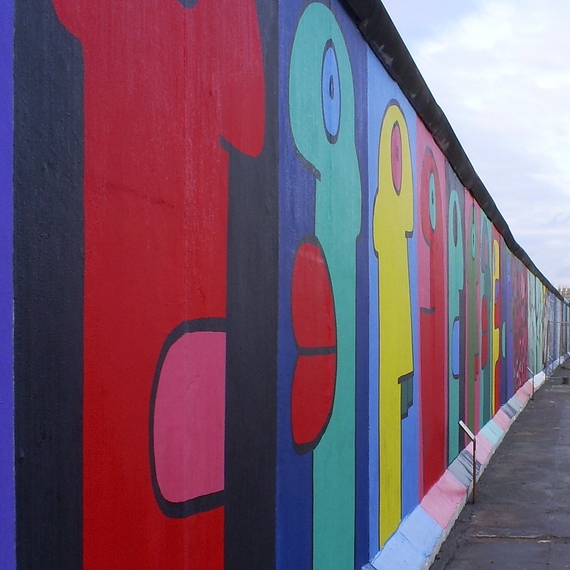One evening, my husband and I were having dinner with friends near Amsterdam. And we were all sharing extraordinary experiences from our years at university.
I described the time that my dorm-mates and I borrowed a car, cut classes, and drove 500 miles through the night to Sebring, Florida International Raceway, to drink beer in the infield, work on our tans and watch Steve McQueen race for 12 hours.
One of the Dutch guys described the moment on Nov. 9, 1989 when he heard the news of the fall of the Berlin Wall, ran out of class, grabbed his passport and sleeping bag, and jumped on a train to Germany because Berlin was the only important place to be that day. He said that what he remembered most was the sound of hammers hitting stone as people chipped away at the wall, eager for a piece of freedom and history.
I listened in awe. Could there be two more culturally different experiences? Did I feel like a goofball? It was tempting -- especially if I believed that everyone else was thinking that.
We spend our formative years collecting a set of beliefs about life. Then we spend the rest of our lives un-believing the ones that don't actually make sense or work effectively. And one of the most challenging to un-believe, and the one with perhaps the most negative impact on us, is the belief that what other people think about us matters more than what we believe about ourselves.
One of my friends told me that, when she was growing up, her mom always asked, "What will people think?" So my friend believed that, no matter what she did, it would always be less important than what people were likely to think about it. And she lived as if that were true. She thought first about what others would think before she spoke, dressed or chose friends. She said that by the time she was a teenager, in order to cope, she lived with an imaginary paper bag over her head. Everywhere she went, she wore the bag, so that people couldn't see her -- and that way, they couldn't think about her.
Kids can have it tough, figuring out what's really true and what really matters. Most of them accept whatever the adults around them project onto them, and end up agreeing with it: "Yes, that's right. That's who I am." And later, un-doing those labels takes conscious effort. The first step is to stop letting what others think be a reason to feel bad about ourselves.
There are lots of people out there who want us to jump through their hoops, based on their beliefs and interpretations. They'll tell us that it's in our best interest, but it's probably truer that it would just make them feel better. When we make their hoops more important than doing what makes us feel good, we've stopped listening to our inner guidance for how to live well.
Sure, it can be helpful to ask other people for viable feedback -- but only if we already feel secure enough in our personal value and the other person accepts us exactly as we are, without needing us to change. And who's best qualified to give helpful feedback? Our partners, parents and siblings because they usually know us best -- and especially our children because they'll provide the least colored truth if they feel safe to do it.
And there will never be a better source of feedback than daily life. Whatever we're experiencing is showing us what we believe about life and what we expect from it. So if things aren't going well, it's a red flag: "I need to examine my beliefs and expectations!"
Our response to everything outside of us has little to do with it and everything to do with our relationship with ourselves. "Do I like myself? Am I taking care of me, making sure I feel OK, especially in challenging situations?" The less connected we feel to our value and our well-being, the more emphasis we'll place on what other people think about us.
We're not here to prove our worth. That's already established. We're valuable because we're alive. And there's nothing we need to do or do differently.
I'm fortunate that my mom taught me how to comfort myself back into feeling good, no matter what's happening around me. I've often heard her say, "When life is difficult, I like to sit in the porch swing and rock my soul."
There have been times when my most important success factor was my ability to get to the end of a super-challenging day, and when I finally fell into bed, to still be able to feel good about myself.
So did I feel like a goofball, when the guy's story about the fall of the Berlin wall followed my story about the good time in the infield? No, I felt just fine -- because everyone knows that Steve McQueen was the coolest dude ever.
This post is featured on gracederond.com.
Photo of the Berlin Wall by Santa Fe artist, M. Ricioppo.
